Is the Cuban Missile Crisis Analogous to the Ukraine War?
Morris van de Camp3,060 words
See also: A European View on the War in Ukraine, The Correct White Nationalist View of the Ukraine War, The Truth About the Euromaidan
Part of the ongoing narrative about the ongoing Ukraine War is the idea that it is analogous to the Cuban Missile Crisis of 1962. Believing this analogy means one thinks this conflict can be resolved by hard thinking, a bit of compromise, and several diplomatic cables.
The two most important voices saying this are Russia’s Foreign Minister, Sergei Lavrov, and Professor John J. Mearsheimer of the University of Chicago. Mearsheimer is an influential expert in international relations. In October 2022, Lavrov said that he hoped Biden would display the same wisdom that Kennedy had regarding Cuba in 1962. Mearsheimer has likewise repeatedly stated that the American Deep State’s reckless behavior regarding Ukraine has provoked this crisis. He points out parallels to the Cuban Missile Crisis, saying,
If you look at the Western Hemisphere, the United States has the Monroe Doctrine. The United States does not believe that countries in the Western Hemisphere have a right to have their own foreign policy. During the Cuban Missile Crisis, when I was young, we did not believe that Cuba had the right to invite the Soviets to put missiles in Cuba. The same basic principle that the United States applies in the Western Hemisphere is the one the Russians are applying vis-à-vis Ukraine.
Is the Ukraine War analogous to the Cuban Missile Crisis? To put it succinctly, no. The circumstances around the Ukraine War are far more complex than those which encompassed the Cuban Missile Crisis.
In 1962, the United States and the Soviet Union, an expanded and far more ruthless version of the old Russian Empire, were locked in an ideological conflict that affected every part of the planet. In 1962, there were US-USSR standoffs in Berlin, American troops in South Korea, spies everywhere, and a secret and steady deployment of American military advisors to South Vietnam. Both powers had large arsenals of nuclear weapons and the capability to destroy each other over the course of an afternoon.
The Cuban Missile Crisis
The Cuban Missile Crisis started when the Soviets launched the Sputnik artificial satellite in 1957. This demonstrated to the American public that the Soviets were ahead of the US in rocket development. While the Soviets were building rockets, there was trouble in Cuba, which was then ruled by Fulgencio Batista.
Batista ascended the presidency by means of a military coup in 1952. He was then opposed by Fidel Castro, a wealthy and educated young Cuban. Castro was briefly imprisoned due to his anti-Batista activities, so he went to Mexico upon release, then returned to Cuba with a revolutionary cadre in 1956. His group hid out in Cuba’s Sierra Maestra mountains, broadcast metapolitcal content on their portable radio, and directed guerrilla activities.
In the America of the 1950s and early ‘60s, the political Left was even more socially dominant than today. In the 1950s, Leftist Americans were bedazzled by revolutionaries such as Castro. Like the nice white liberals of today, they couldn’t see the approaching and obvious danger. In 1959 Castro was even featured positively in the American mainstream media.
Castro took over Cuba in January 1959, and for a time, the American Deep State supported him. Eventually, they realized that Castro was completely hostile to America. Thus, President Kennedy decided to overthrow Castro using a brigade of anti-Castro Cuban exiles.
The anti-Castro invasion failed, however, and Kennedy realized he had miscalculated badly. Additionally, Kennedy, who chronically suffered from Addison’s disease, appeared lost and indecisive during a meeting with Soviet Premier Nikita Khrushchev at a summit in Vienna. Khrushchev then decided to put nuclear-capable missiles in Cuba.
The missile sites were discovered by American intelligence assets. The Kennedy administration assessed the situation, “quarantined” Cuba, threatened war, and finally Khrushchev backed down after he also realized that he had miscalculated. The Kennedy administration and its wildly sympathetic supporters in the mainstream media hailed the resolution of the crisis as a great success.
But the end of the Cuban Missile Crisis was not so much a success as an avoidance of failure. Kennedy was helped by several factors. The first was that there was a broad understanding among all the parties that the crisis could spin out of control and the results would be catastrophic; this was far different from the assumptions made by world leaders in August 1914. Another was the fact that international relations were aligned around only two poles. Kennedy only had to reach out to the Soviets; he didn’t need to worry about several independent powers acting in their own interests.

Public opinion in Europe was jubilant for war by the late summer of 1914, but in 1962 the public was disheartened and concerned. The image (above) clearly expresses a party-like atmosphere as Germans leave for the front. The Hawk Missile position on the beach during the Cuban Missile Crisis of 1962 (below) displays considerable gloom.
Cuba and the Cold War After the Crisis
The Kennedy administration ruled by lies and omissions. While Kennedy claimed a flawless victory over the Soviets to the American public, he secretly promised to Moscow that he would withdraw American nuclear-capable Jupiter Rockets from Turkey. Kennedy further promised not to invade Cuba. The Soviets did indeed withdraw their missiles from Cuba, but nuclear-capable Soviet Tupolev Tu-95 “Bear” bombers continued to fly from Murmansk to Cuba until the end of the Cold War. The nuclear threat from Cuba was reduced, but didn’t really end.
Cuba had a dynamic foreign policy during the Cold War. In the 1970s and ‘80s, Cuban troops shored up Communist revolutionary movements across Africa and South America. Cuban troops deployed to Grenada in 1983, although they were ousted by an American invasion. Even today, there are possibly more than 20,000 Cuban soldiers currently deployed to support Venezuela’s Leftist regime.
Cuba & the Monroe Doctrine
John Mearsheimer argues that as Cuba is not free to have an independent foreign policy because of its proximity to America, so too is Ukraine unfree due to its proximity to Russia. His statement is curious. As demonstrated above, Cuba has a very robust foreign policy; it just doesn’t host Russian missiles.
The Monroe Doctrine doesn’t mean that nations in the Western Hemisphere cannot have an independent foreign policy. The doctrine, as explained by President James Monroe on December 2, 1823, is the following:
We owe it, therefore, to candor and to the amicable relations existing between the United States and [European Colonial Powers] to declare that we should consider any attempt on their part to extend their system to any portion of this hemisphere as dangerous to our peace and safety. With the existing colonies or dependencies of any European power we have not interfered and shall not interfere, but with the Governments who have declared their independence and maintained it, and whose independence we have, on great consideration and on just principles, acknowledged, we could not view any interposition for the purpose of oppressing them, or controlling in any other manner their destiny, by any European power in any other light than as the manifestation of an unfriendly disposition toward the United States.
In plain terms, this means that the policy of the United States since 1823 has been to support the independence of nations in the Western Hemisphere. These nations are free to have their own foreign policy as independent nations, however. While the United States has intervened in its near abroad to support this or that government against this or that revolutionary movement, there aren’t nuclear missiles in Texas aimed at Brazil, nor have there been mass rapes or the sacking of cities such as happened when the Russians invaded other nations in their near abroad. South American nations have their own foreign policies, and occasionally go to war against each other.
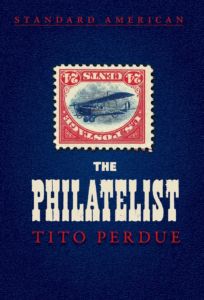
You can buy Tito Perdue’s The Philatelist here.
There is also no way for Russia to have a comparable Monroe Doctrine in its near abroad in Europe. What is Russia’s near abroad? Germany? France? Iran? China? Why didn’t they stop NATO’s advance into Poland and the Baltics and use the pretense of NATO expansion into Ukraine to invade?
What nation within the Russian near abroad would be foolish enough not to pursue acquiring as many weapons as possible and making alliances with other nations, given Russia’s long history of bad government and harsh military occupation?
Russia & Ukraine
I have written in depth before that the further east NATO expands, the greater the danger. This is true, but it is only true from the perspective of NATO’s far west: Canada, Great Britain, and the United States. For the nations in Eastern Europe, the further NATO’s Drang nach Osten extends, the less the danger. Poland, the Baltics, and so on have obtained a security guarantee that aligns them with the economies of Western Europe and North America and their vast militaries.
On the other hand, Russia sees NATO expansion as a very big threat. Russia’s concerns are not entirely unwarranted. They have been invaded many times over their long, sad history. The first invaders, the Mongols, were especially harsh. In response to this, the Russians have developed a strategy of controlling the invasion routes into the Russian Heartland. The Soviet Union held all the entry points to their nation during the Cold War, as well as a glacis in Eastern Europe whose front extended from Stettin in the Baltic to Trieste in the Adriatic.
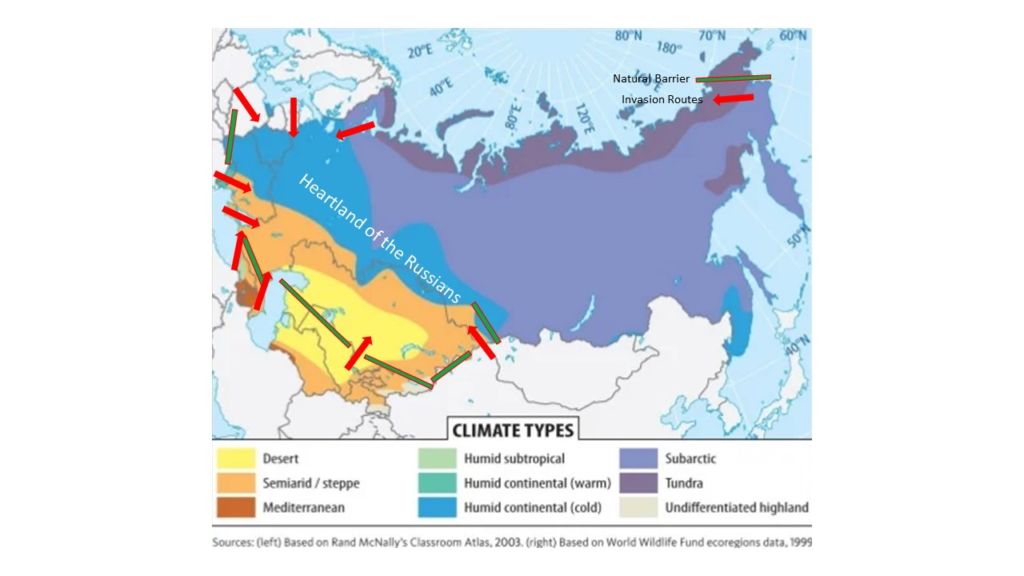
During the Cold War, the Soviet Union controlled every invasion route into the Russian Heartland. The ethnic Russian heartland corresponds with the Continental Climate Zone, where wheat can be grown.
While Russia is correct about NATO’s eastern expansion in a general sense, they are overreacting to this threat with their 2022 invasion of Ukraine. NATO consists of five key partners: the US, the UK, Germany, Turkey, and France. All the other members have militaries and economies that are too small and/or dysfunctional to be anything other than an auxiliary force in case of a general war. NATO is entirely dependent on the military might of the United States. But America has an angry and oppressed political faction itching to take America out of the alliance. It might only be a matter of when, not if, America leaves. Additionally, it only requires one “no” vote to block new members, and it is obvious that Germany or France would have blackballed a Ukrainian membership application.
Furthermore, there are no military incursions into Russia from Poland or the Baltics. NATO deployments to those regions are presently nothing like the wargames during the Cold War, such as REFORGER. Additionally, Russia was already in control of the invasion points on its Ukrainian flank. In 2014, they held Crimea and eastern Ukraine, and they have troops in Transnistria.
Russian Demographics Fueling Aggression
Communism might be “nature’s way” of reducing human societies whose populations become too big for their ecosystems. Russia’s demographics have taken a big hit since the Bolsheviks took over and they’ve never really recovered. This demographic collapse is one aspect of the aggression. Peter Zeihan writes,
Today much of Russia’s border regions are indefensible. There are few geographic barriers to block potential invasion, forcing the Russians with their dwindling numbers to attempt to defend massive stretches of territory. What barriers the Russians do have — Crimea and the Caucasus come to mind — are only because of the sort of strategic adventurism that Putin is now threatening to Ukraine as a whole. There is a method to the madness. To paraphrase Catherine the Great, Russia can expand, or Russia can die. . . .
Russia’s had a rough time of . . . everything. The purges of Lenin and Stalin. The World Wars. The post-Soviet collapse. Horrific mismanagement under Khrushchev and Brezhnev and Yeltsin. Sometimes in endless waves, sometimes in searing moments, the Russian birthrate has taken hit after hit after hit to the point that the Russian ethnicity itself is no longer in danger of dying out, it is dying out. And for this particular moment in time, there just aren’t many teens today to fill out the ranks of the Russian military tomorrow.
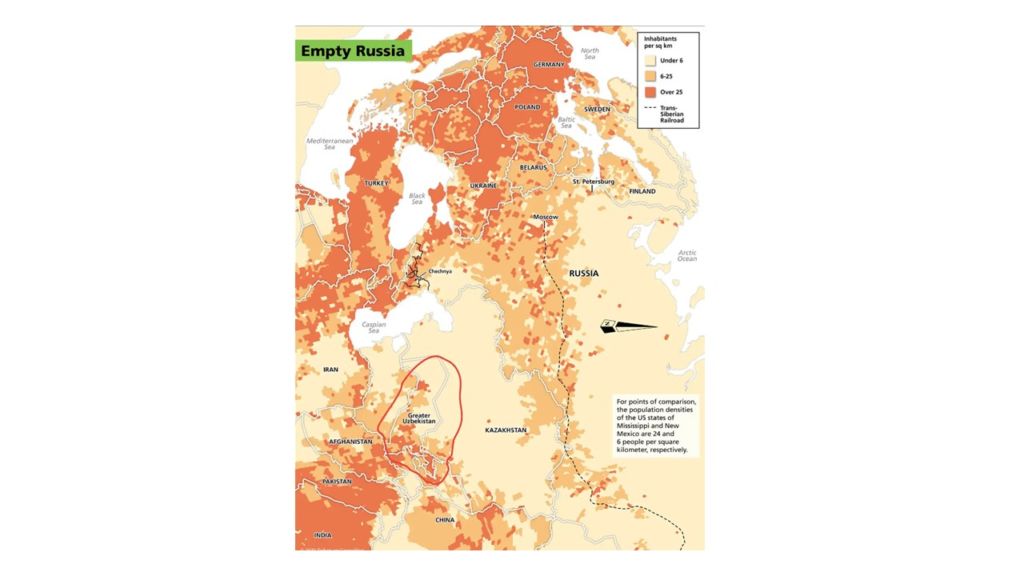
Peter Zeihan argues that Russia’s demographic collapse is fueling aggressive military actions. The homeland of the ethnic Russians can only be defended by large military formations positioned on key terrain features. (Map Source)
The Ukrainian Ethnostate
Ukraine’s history with Russia has always been problematic. After becoming part of the Russian Empire, the trouble began immediately. A good summation can be found in a 1988 publication about global ethnic conflicts:
After resisting the Russification programs of their Czarist masters at great cost, the Ukrainians fought for their independence each time Russia was weakened by one of the twentieth century’s world wars. In 1918, a Ukrainian declaration of independence led to three years of ultimately unsuccessful war against Russia, after which the area became part of the Soviet Union. During the earlier civil war, the Ukrainian nationalist movement waged guerrilla war against both Red and White Russians. At the time of World War II, many Ukrainians were initially pro-German but became disillusioned when the Nazis rebuffed their aspirations. Ukrainian guerrillas continued to fight against the Soviets until the early 1950s, killing an estimated 35,000 after 1945.
In his famous 1956 de-Stalinization speech, Nikita Khrushchev stated that Stalin wanted to deport all Ukrainians, but there was no place to deport them. Many were, however, sent to concentration camps or exiled to Siberia. In recent years, Ukrainians still constituted 40 percent of the Soviet Union’s political prisoners, a number more than twice their proportionate population size. The Ukrainians were among the chief victims of Stalinist terror in the 1930s. Up to seven million may have died of starvation in a famine (1932-1933) deliberately created by Stalin’s order that all grain be requisitioned for export during the forced collectivization of agriculture. After the hidden holocaust, Stalin accused Ukrainian leaders of nationalism and treason, and waves of arrests, exiles and executions swept the region in 1933-1940. The Stalinist terror was proportionately more devastating in the Ukraine than in Russia.
The Ongoing Ukraine War
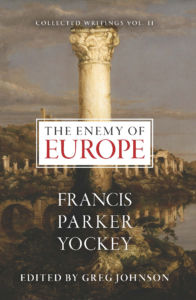
You can buy Francis Parker Yockey’s The Enemy of Europe here.
Russia’s capture of Crimea and the Russian-speaking zones in Ukraine in 2014 were not unjust, given Russia’s legitimate concerns and the long history of Crimea being part of Russia. The 2022 attack on Ukraine is clearly unjust, however.
The Russian excuse for the present war is based on the claim that Ukraine would join NATO. It is obvious that Ukraine would join NATO if it could, but it is unlikely that the alliance would have accepted them given the tensions between it and Russia. Russia is also concerned about “weapons of mass destruction,” but Ukraine has no “weapons of mass destruction” program.
Additionally, no member of NATO was considering putting long-range missiles or nuclear weapons into Ukraine. Since the end of the Cold War, nuclear weapons have been removed from Germany and South Korea. Missiles placed in Poland are part of a diplomatic card game; they’re deployed on the ground for a few years, a deal gets cut, and then they are removed.
What Should White Advocates Do?
The Ukraine War is far different from Cuban Missile Crisis. Additionally, it is possible that Walt Mearsheimer’s idea that “the West” has led Ukraine down the “primrose path” to destruction is not entirely correct. Ukrainians and their backers in the West did what they could to achieve an alliance, but the West did not fully respond to this appeal. The Russians decided to attack on their own.
It is very likely that the fraudulent US election of 2020 and Joe Biden’s obvious cognitive decline helped to persuade the Russians to attack. But unfortunately, there is no way to go back in time and correct the 2020 election. So, what should white advocates do?
The ongoing Ukraine War is the second conflict in Europe since the end of the Cold War in which a belligerent used National Socialist imagery. In the 1990s, Croatia reactivated its National Socialist Ustaše militia and used those troops to fight for independence. These actions, however symbolic, do give the political far Right in Europe and America a considerable boost in credibility should the Ukrainians win this conflict.
Americans can help Ukraine through funding and moral support with an eye toward keeping out of the war. During the First World War, the United States was drawn into the conflict in part to get back the loans it had made to the British. With that in mind, funding for Ukraine should be grants, not loans. That way if things go badly for Ukraine, there is no pressure from bankers, 401K owners, and so on upon the US government to enter the conflict.
No American should enlist to personally fight for Ukraine. American white advocates need to stay here and work as hard as they can to develop pro-white institutions at home that can reverse the Great Replacement and align American foreign policy with the interests of Americans.
Americans — white advocates — should point out to the Ukrainians that parts of their territory might be lost for good. It might cost 100,000 Ukrainian casualties or more to take back Crimea, and then they will be forced to hold the peninsula in the face of a potential long-running insurgency. And there might be another war with Russia, anyway. Russian security concerns guarantee such an outcome. Russian birthrates might not be low forever. A “frozen conflict” could be a good outcome.
The war could drag on, though. This could be a decade-long slog, such as the Iran-Iraq War. It could also end with the political scene in Europe growing as hot and divisive as it was between the world wars.
The Cuban Missile Crisis was not a war; it was a diplomatic gamble on the part of the Soviets which was successfully beaten in part by a diplomatic gamble on the part of the Americans. The causes of the Ukraine War are far more complex than the causes which led the Soviets to install missiles in Cuba. This war reflects deep insecurities on the part of two nations, and those nations are calling in favors from other nations. And lastly, the world is multipolar, and independent powers are reacting differently.
In the end, wars are easy to start, but very hard to end. How this one will end is anyone’s guess.
* * *
Counter-Currents has extended special privileges to those who donate $120 or more per year.
- First, donor comments will appear immediately instead of waiting in a moderation queue. (People who abuse this privilege will lose it.)
- Second, donors will have immediate access to all Counter-Currents posts. Non-donors will find that one post a day, five posts a week will be behind a “Paywall” and will be available to the general public after 30 days.
- Third, Paywall members have the ability to edit their comments.
- Fourth, Paywall members can “commission” a yearly article from Counter-Currents. Just send a question that you’d like to have discussed to [email protected]. (Obviously, the topics must be suitable to Counter-Currents and its broader project, as well as the interests and expertise of our writers.)
To get full access to all content behind the paywall, sign up here:
Paywall Gift Subscriptions
 If you are already behind the paywall and want to share the benefits, Counter-Currents also offers paywall gift subscriptions. We need just five things from you:
If you are already behind the paywall and want to share the benefits, Counter-Currents also offers paywall gift subscriptions. We need just five things from you:
- your payment
- the recipient’s name
- the recipient’s email address
- your name
- your email address
To register, just fill out this form and we will walk you through the payment and registration process. There are a number of different payment options.
Is%20the%20Cuban%20Missile%20Crisis%20Analogous%20to%20the%20Ukraine%20War%3F
Share
Enjoyed this article?
Be the first to leave a tip in the jar!
Related
-
Stalin’s Affirmative Action Policy
-
Sperging the Second World War: A Response to Travis LeBlanc
-
Communist Barbarism in Hungary — and America Today: When Israel Is King
-
The Establishment’s Radicals
-
Bo Gritz, Ruby Ridge and Presidential Run, Part 2: 1987-present
-
Bo Gritz, Vietnam Veteran and Military Adventurer, Part 1: 1939-1986
-
The Red Terror in Kiev: A Warning from a Century Ago, Part 2
-
The Red Terror in Kiev: A Warning from a Century Ago, Part 1
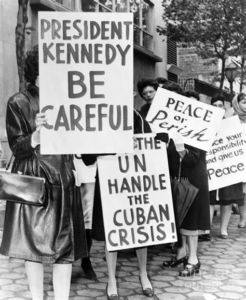

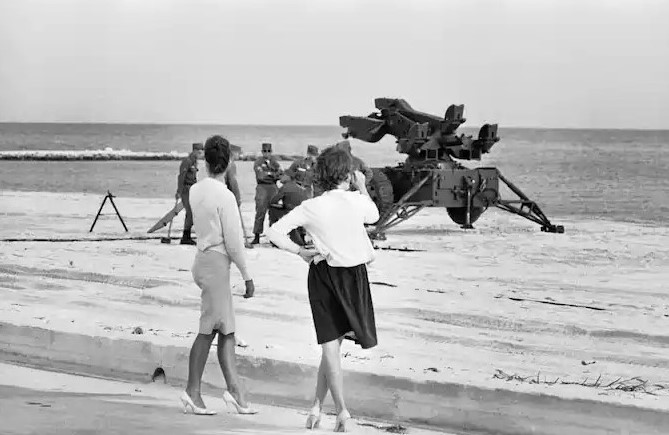
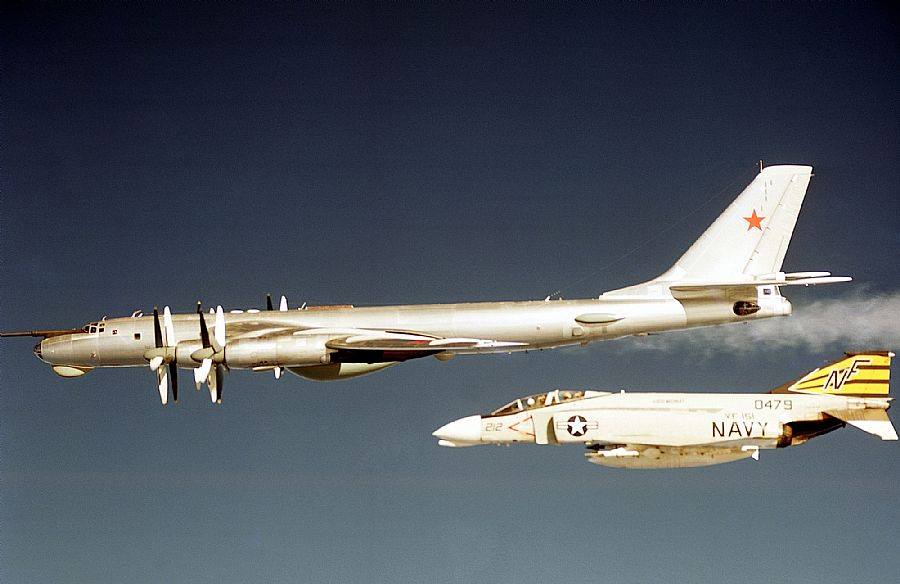
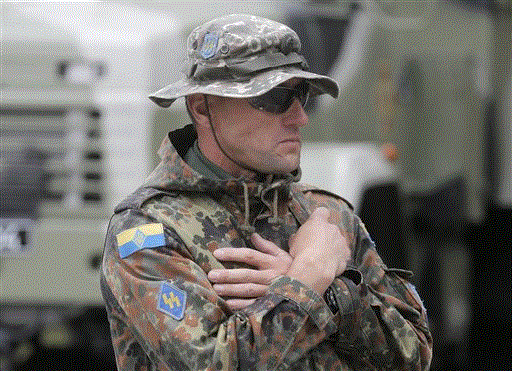
7 comments
“Believing this analogy means one thinks this conflict can be resolved by hard thinking, a bit of compromise, and several diplomatic cables.
The two most important voices saying this are Russia’s Foreign Minister, Sergei Lavrov, and Professor John J. Mearsheimer of the University of Chicago.”
It was startling to read this after listening to an hour of John J. Mearsheimer saying the opposite. He thinks all three parties to the war remain committed to victory, and there is no way for everybody to win. He does not see the path to a negotiated solution, and he fears the small but non-trivial chance of escalation.
According to John J. Mearsheimer’s thinking, the right time to stop the Russo-Ukrainian war with “hard thinking, a bit of compromise, and several diplomatic cables” would have been in 2008.
“John Mearsheimer argues that as Cuba is not free to have an independent foreign policy because of its proximity to America, so too is Ukraine unfree due to its proximity to Russia. His statement is curious. […] The Monroe Doctrine doesn’t mean that nations in the Western Hemisphere cannot have an independent foreign policy.”
Mearsheimer must be referring to the (Teddy) “Roosevelt Corollary to the Monroe Doctrine,” an old obfuscation.
Where President Monroe forbade foreign colonial mischief in the New
World as not being in the American national interest ─ and eschewing U.S. foreign intervention likewise ─ TR rode the coattails of the Monroe Doctrine, then whipped out his proverbial Big Stick and flipped the august principle on its head.
As Stanford Professor of History Thomas A. Bailey (1956) put it,
Oh goody.
🙂
If Russia is seriously worried about white ethnic Russians dying out, why the hell are they pushing all their men from 16 to 60 into the military to invade and takeover Ukraine? I can’t think of a worse way to ruin your own ethnic future. And if Russia wishes to corral young ethnic white Ukrainians which they consider ‘their own people’, going to war and killing the cream of the male crop of Ukrainians, along with starving out the women and children of the country as well — how can this ever create a victory? This is certainly the worst “brother war” since WWII. But of course, no American, Canadian, or Western European politician would ever dream of pointing out this RACIAL aspect of the conflict. They avoid this topic like the plague. And yet, this is the basis of disaster for both Ukraine and Russia.
The 100. 000 soldiers figure underestimates the precariousness of Crimean logistics. It’s technically a peninsula, but it is far better to think of it as an island with one causeway and two bridges linking it to the mainland. It’s also almost completely bereft of water and local food production.
The causeway is currently under Ukrainian fire control. The bigger of the two bridges (Kerch) has been damaged and is operating at reduced capacity. The last bridge near Henichevsk on the Azov coast was recently imperilled by a Ukrainian rocket strike (though not hit).
If the Ukrainians manage to sever the land connection between Crimea and Russia near Melitopol, they’ll be withing rocket range of the Kerch bridge, taking it out for good and completely cutting Crimea off from supply. Resupply by air would be impossible given the density of AA coverage in the contested sky and resupply by sea would funnel all Russian ships in the only two functional ports, Sevastopol and Kerch. Of these, Sevastopol is already within land-to-sea missile range and Kerch would be if the Ukrainians took Melitopol.
After that, it’s only a matter of waiting the Russians out until they run out of supply, which due to the lack of local water would be very soon.
I would rather note another analogy. How the clumsy policy of the USA, the Dulles brothers, first of all, and then Kennedy himself only led to the consolidation of the Castro dictatorship and strengthened the unity of the Cuban people and their support for the dictator, as well as turned Cuba into a military base for the USSR and later a source of problems throughout the world, so alike the Russian attempt to “demilitarize” and “denazify” Ukraine only leads to the strengthening of its militarization and the strengthening of the nationalist spirit in the Ukrainian elite and the population, even in those people which a year ago were ready to make compromises with Russia and would not even be against formally giving up on the same Crimea to Russia.
In the 1970s and ‘80s, Cuban troops shored up Communist revolutionary movements across Africa and South America.
Cuban troops fought in Angola in support of that country’s MPLA (communist, pro-Soviet) government and against the UNITA (sometimes pro-Western) movement in the late 1970s and beyond. This was especially critical in the post-1974 scramble for power as the Portuguese departed their former colony and Angola was up for grabs.
The Cubans also engaged South African forces in a series of battles in Angola, notably the Cuito Cuanavale campaign of 1987-88. Generally, the South Africans had the tactical edge and also the covert backing of the USA. But winning battles could not be translated into strategic victory. In part this was due to the SA government being reluctant to risk too many casualties, in part because of the usual pearl clutching in Western capitals over apartheid.
The communists touted the stalemate in the Bush War as a victory over apartheid-imperialism. And they claimed (with perhaps some veracity) that this translated into increased opposition to apartheid, domestically and internationally, which eventually led to the collapse of White rule in South Africa.
The point of this digression goes back to the Cuban revolution. As a result of Castro’s victory, Moscow could employ Cuban troops as a global expeditionary force because this avoided overt Soviet military intervention in the third world with the obvious diplomatic implications. Had the Cubans not been available, the MPLA might have been overthrown by UNITA-SA forces. And with that, the White political-military position in SA would have been strengthened.
James Burnham has an essay somewhere on the halfway measures and ideological delusions which determined much of United States foreign policy in the middle Cold War. A more rational US policy in the late 1950s and early 1960s could have kept Castro out of the Soviet orbit. The failure to implement such policies played out with military actions in remote Cold War hotspots having global ramifications.
Something to be considered today as the Beltway crashes around in the chaos of the New World Order.
A more rational US policy in the late 1950s and early 1960s could have kept Castro out of the Soviet orbit.
I am totally agree with it. Che Guevara was a Communist, but Castro was left-nationalistic populist, but not a Communist. American attitude to Cuba, and especially Bay of Pigs made him a Communist.
Moreover, I would say much the same about such originally neutralist and nationalist politician as Nasser of Egypt, Sukarno of Indonesia, and even Uncle Ho of Vietnam, and also of some less important rulers in Africa, Asia and South America. They all were nationalists, but originally not pro-Soviet, however the clumsy and too rigid, absolutely unflexible, American foreign policy, developed and led by J.F. Dulles, pushed them to Khrushchov.
Comments are closed.
If you have Paywall access,
simply login first to see your comment auto-approved.
Note on comments privacy & moderation
Your email is never published nor shared.
Comments are moderated. If you don't see your comment, please be patient. If approved, it will appear here soon. Do not post your comment a second time.
Paywall Access
Lost your password?Edit your comment